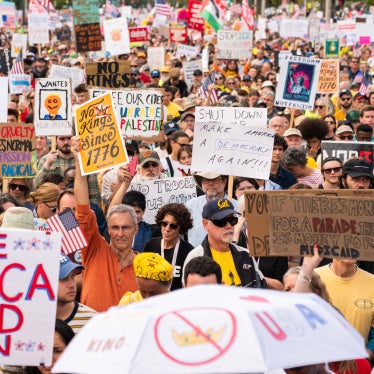(Baghdad) – Iraq cracked down harshly during 2011 on freedom of expression and assembly by intimidating, beating, and detaining activists, demonstrators, and journalists, Human Rights Watch said today in its World Report 2012.
In February, Human Rights Watch uncovered a secret detention facility controlled by elite security forces who report to the military office of Prime Minister Nuri al-Maliki. The same elite divisions controlled Camp Honor, a separate facility in Baghdad where detainees were tortured with impunity.
“Iraq is quickly slipping back into authoritarianism as its security forces abuse protesters, harass journalists, and torture detainees,” said Sarah Leah Whitson, Middle East director at Human Rights Watch. “Despite U.S. government assurances that it helped create a stable democracy, the reality is that it left behind a budding police state.”
In its 676-page World Report 2012, Human Rights Watch assessed progress on human rights during the past year in more than 90 countries, including popular uprisings in the Arab world that few would have imagined. Given the violent forces resisting the “Arab Spring,” the international community has an important role to play in assisting the birth of rights-respecting democracies in the region, Human Rights Watch said in the report.
In the weeks before the last convoy of US troops left Iraq on December 18, Iraqi security forces rounded up hundreds of Iraqis accused of being former Baath Party members, most of whom remain in detention without charge. Apolitical crisis and a series of terrorist attacks targeting civilians have rocked the country in the weeks since the US troop pullout.
During nationwide demonstrations to protest widespread corruption and demand greater civil and political rights in February, security forces violently dispersed protesters, killing at least 12 on February 25, and injuring more than 100. Baghdad security forces beat unarmed journalists and protesters that day, smashing cameras and confiscating memory cards.
In June, in one of the worst incidents, government-backed thugs armed with wooden planks, knives, and iron pipes, beat and stabbed peaceful protesters and sexually molested female demonstrators as security forces stood by and watched, sometimes laughing at the victims.
In May, the Council of Ministers approved a Law on the Freedom of Expression of Opinion, Assembly, and Peaceful Demonstration, which authorizes officials to restrict freedom of assembly to protect “the public interest” and in the interest of “general order or public morals.” The law still awaits parliamentary approval.
Freedom of expression fared little better as security forces routinely abused journalists covering demonstrations, using threats, arbitrary arrests, beatings, and harassment, and confiscating or destroying their equipment. On September 8, an unknown assailant shot to death Hadi al-Mahdi, a popular radio journalist often critical of government corruption and social inequality, at his home in Baghdad. Immediately before his death, al-Mahdi had received several phone and text message threats not to return to Baghdad’s Tahrir Square, which was the focal point for the weekly demonstrations. Earlier, after attending the February 25 “Day of Anger” mass demonstration, security forces arrested, blindfolded, and severely beat him and three other journalists during a subsequent interrogation.
In January 2012, Human Rights Watch observed that Iraqi authorities had successfully curtailed the Tahrir Square anti-government demonstrations by flooding the weekly protests with pro-government supporters and undercover security agents. Dissenting activists and independent journalists for the most part said that they no longer felt safe attending the demonstrations.
“After more than six years of democratic rule, Iraqis who publicly express their views still do so at great peril,” Whitson said. “Al-Mahdi’s killing highlights what a deadly profession journalism remains in Iraq.”
Prison brutality, including torture in detention facilities, was a major problem throughout the year. In February, Human Rights Watch uncovered, within the Camp Justice military base in Baghdad, a secret detention facility controlled by elite security forces who report to al-Maliki’s military office. Beginning in late 2010, Iraqi authorities transferred more than 280 detainees to the facility, which was controlled by the Army’s 56th Brigade and the Counter-Terrorism Service.
The same elite divisions controlled Camp Honor, a separate facility in Baghdad where detainees were tortured with impunity. More than a dozen former Camp Honor detainees told Human Rights Watch that detainees were held incommunicado and in inhumane conditions, many for months at a time. Detainees said interrogators beat them; hung them upside down for hours at a time; administered electric shocks to various body parts, including the genitals; and repeatedly put plastic bags over their heads until they passed out from asphyxiation.
“Security forces in Iraq, particularly in detention facilities, violate rights with impunity, and the government too often looks the other way,” Whitson said. “The government needs to ensure that there will be genuine criminal investigations and prosecutions of anyone responsible for torture or other abuses.”






